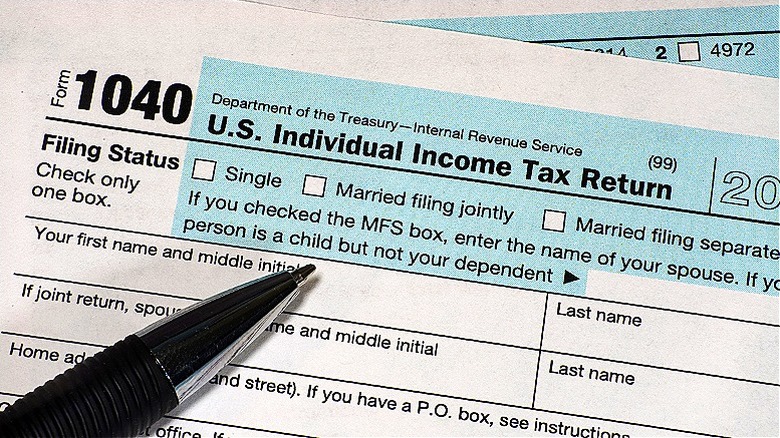The Big Reason Some Married Couples Might Want To File Taxes Separately
Merging finances is a big deal, and the decision to get married can make this financial merger even more convoluted. While the tax breaks and dependent credits that come with filing your taxes jointly can definitely be helpful for some couples and families, it's not always the best financial decision to file your taxes together. For those that might not already know, the IRS offers multiple filing options and among the choices for married couples is the option to file as "married filing separately." This option essentially allows married couples the opportunity to file their income, deductions, and exemptions separately from one another. While you might be thinking the whole point of getting married is to merge your assets and separate financials, sometimes it can actually hurt you financially (or even legally) to do this.
The decision to file jointly (or separately) can depend on a host of financial factors, so deciding how to file comes down to each individual couple and their finances. Plus, this decision can also be influenced by factors like income levels, retirement account contributions, and even the specific tax laws in their state. While no one exactly loves doing their taxes, and filing separately can definitely add a bit more work to the process (for instance, if one person in the marriage decides to itemize their deductions, then both have to itemize even though they're filing separately), there can still be helpful, and financially beneficial, reasons for filing separately.
Reasons to file taxes separately
Perhaps one of the biggest reasons for married couples to file taxes separately is if one person in the relationship has outstanding debts and/or previous tax issues. If you or your partner have back taxes, owed child support, medical bills, or defaulted federal loans (e.g., student loans) then filing jointly can mean that your joint return is taken in order to cover those debts. This means any part of the tax return amount that you or your partner might have received will instead be used to pay off those pre-existing debts. Remember, this only applies if you file jointly whereas filing separately keeps any individual tax returns separate. This means that any return amount for one of you will not be automatically available to pay for debts owed by the other.
Similarly, filing separately ensures you're not found liable for any errors or issues that might occur with your partner's taxes. If you're concerned in any way about them filing incorrectly or falsely claiming credits, filing separately ensures you won't be on the hook for any tax evasion penalties that might come their way. Of course, if this is a genuine concern, it could be worth having a deeper financial discussion with your spouse. Other reasons to file separately can be related to your income level. If your dual income would be enough to push you into another higher tax bracket, it could be worth filing separately to avoid the higher tax rate.
Things to know about separate tax returns
First and foremost, the option to file your taxes as "married filing separately" only applies to legally married couples who married before the end of the tax year in question. Also, if you and your spouse are legally separated and have a specific separate maintenance decree arrangement, for IRS purposes you're not considered married. In this case, you could choose single or head of household as your filing status.
Filing separately means you won't be eligible for many of the associated tax breaks given to married couples, which include child and education credits. This can also affect credits and exclusions for qualified adoption expenses. Another factor to consider is whether you or your spouse contribute to retirement accounts. The income limits for IRA contributions are lower when filing separately than if you file jointly. Just how limited these contributions are depends on whether you lived with your spouse at all during the tax year.
If you decide to file separately, remember you don't need to declare your spouse's income on your taxes, with one notable exception. If you live in a community-property state (i.e., Arizona, California, Idaho, Louisiana, Nevada, New Mexico, Texas, Washington, and Wisconsin), you'll have to calculate "community income" when filing, which can add an additional layer of complication to the process. In these instances, it could be worth discussing filing with a tax expert, who can provide more in-depth knowledge of the nuances of this type of filing.


